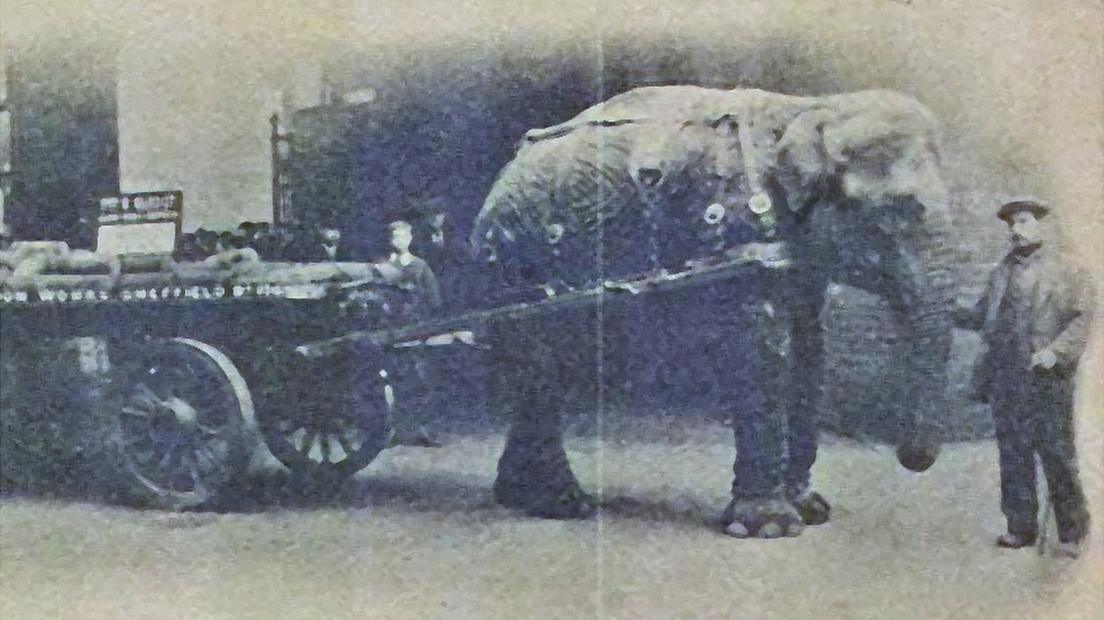Advocates fight against fake service dogs
- Published
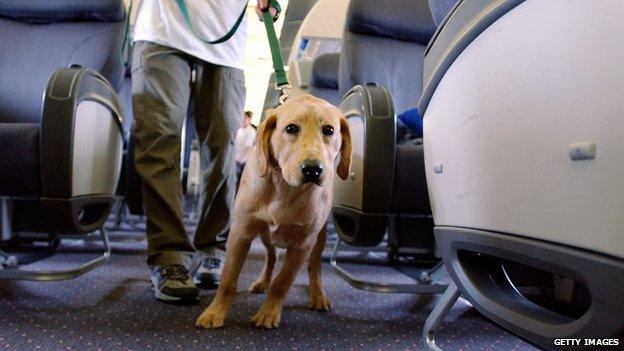
Service dogs are a familiar sight in shopping malls, restaurants and airports. They wear colourful waistcoats, or vests, denoting their high level of training to assist people with disabilities. They include guide dogs for the blind, hearing dogs, seizure alert dogs and mental health service dogs.
But increasingly, according to qualified handlers, more and more people are falsely claiming their dog is a service animal.
California-based Canine Companions for Independence, a non-profit organisation that provides highly trained assistance dogs for people with disabilities, says "service dog fraud" is making it more and more difficult for genuine owners to be taken seriously.
"They have seen an increase in encounters with pet dogs, out in public, wearing service dog vests, who have obviously not been trained," says spokeswoman Jeanine Konopelski.
In some cases the fake service dogs are observed behaving badly and there have been reports of people being bitten by these untrained animals, Konopelski said. She adds that it has resulted in some shop and restaurant owners adopting a more suspicious attitude towards anyone claiming their companion is a working dog.
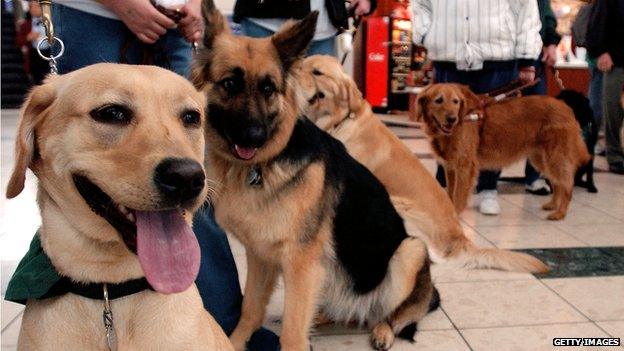
Canine Companions for Independence say the situation is threatening the ability of genuine owners to exercise their rights of access under the Americans with Disabilities Act.
The organization is compiling a petition, external - currently with about 30,000 signatures - urging the US Department of Justice to crack down on the sale of fake service dog products.
It is easy to buy a service dog vest on the internet. Numerous websites offer products such as official harnesses and tags. In some cases they are sold with a note stating that it is the owner's responsibility to ensure their animal is properly trained, but there is no system of enforcement.
Erin, who preferred not to give her full name, lives with her boyfriend and their dog, Bo, in Los Angeles.
She went online to buy a service vest for her pooch, because she wanted to avoid the fees charged by airlines for non-service animals - in the region of $90-$150 (£60-£100) to fly, one-way. Unlike working animals, they must be restrained in a container for the entire flight.

Bo, who has false credentials as a service dog, travels everywhere for free
Erin, who is not disabled, travels everywhere with Bo because she says she can not bear to leave him home alone.
"I just love him so much, it's crazy," she says.
For $150, she purchased from a website a vest and certificate, stating that Bo is a full service dog.
She says she feels guilty about cheating the system, but adds that she has a number of friends who behave in the same way.
"It concerns me when there are four dogs on a flight, and I know that mine isn't fully certified," she says. "I know he's fine but I don't know if some other dog is going to freak out."
It is a scenario that Jody Ambrose, an animal behaviourist and trainer, has experienced while travelling with a service dog.
"These dogs are not machines and one of the hardest things in the world for them is when they are solicited by another dog to play or to fight," she says.
"When there are a lot of dogs in an airport or a public place that are not trained properly, it causes a lot of difficulty for the disabled person that is using a working dog."
Randy Dexter, from the San Diego area, is retired from the US Army. He suffers from Post Traumatic Stress Disorder (PTSD) and has a traumatic brain injury. He is a legitimate owner of a fully trained service dog.
As a combat medic he served two tours in Iraq. In 2005 his squad was hit by an improvised explosive device. Despite Staff Sergeant Dexter's best efforts he was unable to save the life of an Iraqi civilian who was caught in the blast. That incident, which led to feelings of guilt, resulted in him suffering from severe psychological problems.
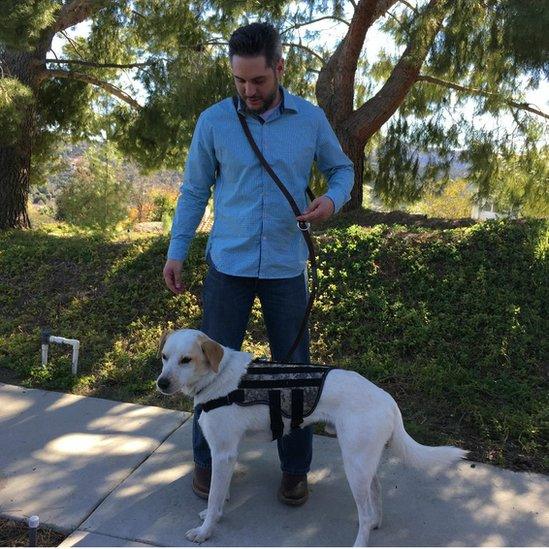
Captain is trained to stand in front of his owner in order to provide space in crowds
"When people get too close it feels like spiders are crawling on your skin," he explains.
He's is still nervous in public but since getting his dog, Captain, Dexter's life has been transformed.
"Flying is not fun, it is a compact place and there's 9/11. It just plays on your mind."
Captain is trained to act as a safety barrier. He will instinctively position himself in front of Dexter for protection, or "cover." The animal provides physical as well as emotional support.
The overwhelming need for Dexter to travel with his dog puts into perspective the dilemma faced by those who try to cheat.
The service dog industry is wary of pushing for a wholesale clampdown on the sale of service dog equipment, such as vests. It is a valuable resource to those owners who home-train their animals.
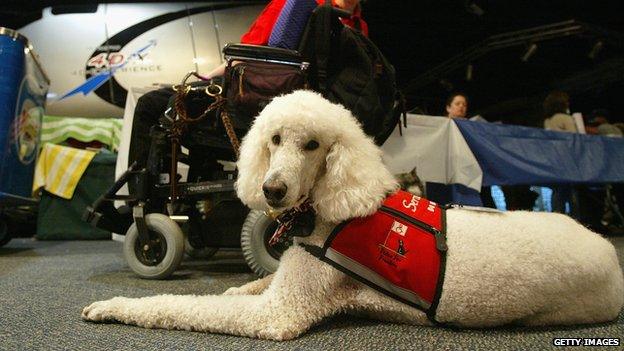
There is growing concern that people are abusing a system that allows service animals to fly for free
Another area of concern is people flying with animals that they falsely claim they need for emotional support.
Many travellers are accompanied by their pets because they have special permission, based on a doctors' letter and an official certificate. Unlike service dogs, emotional support animals (ESAs) are not required to have any formal training, but are allowed on board without an additional fee.
"An emotional support animal is an animal that brings comfort and calmness to an individual that has some level of anxiety in public," says Kelly Gorman Dunbar, a dog trainer from Berkeley in Northern California.
These can include PTSD, social phobia and bipolar disorders.
Still, she says, "I know more faux emotional support dogs than real ones."
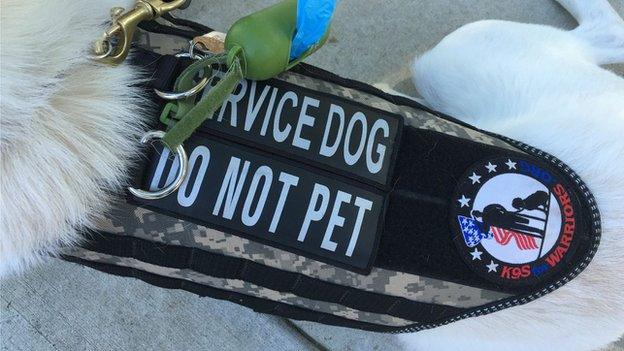
An increasing number of animals are wearing service vests, whether they have been trained or not
Issues with both service dogs and ESAs highlight a disquiet amongst some Americans regarding increasingly strict rules controlling where animals are allowed.
"I think a lot of this could be resolved by having different legislation about animals being allowed in public transportation and perhaps in cafes and more public places," says Dunbar.
"Unfortunately it is going in the other direction, which is I why I think we are seeing so much abuse."
- Published11 November 2013
